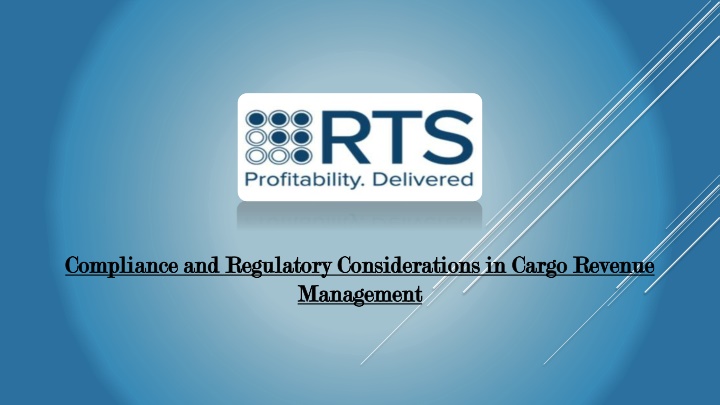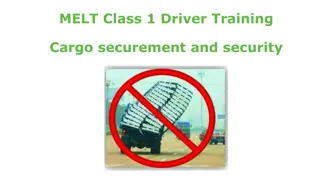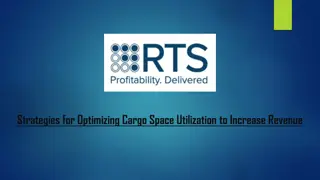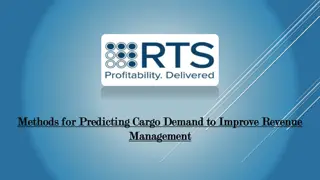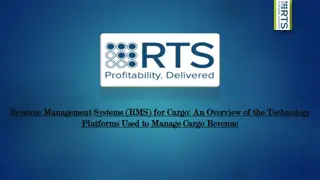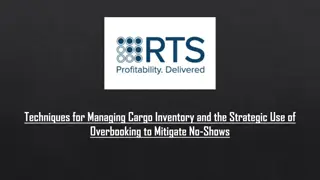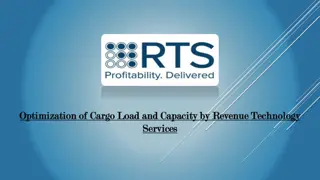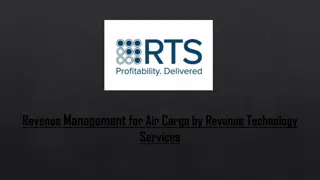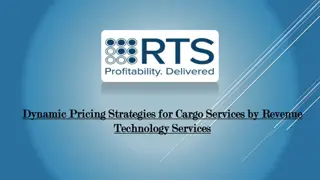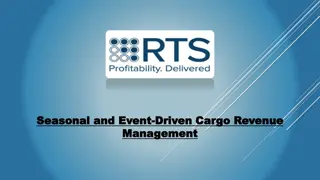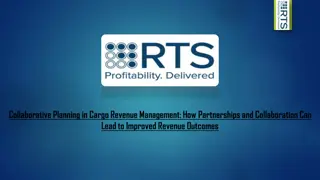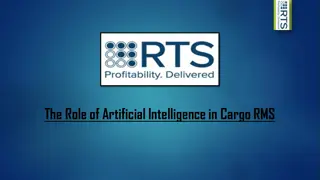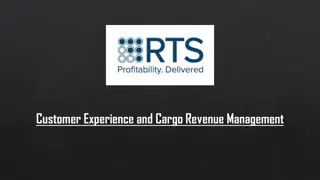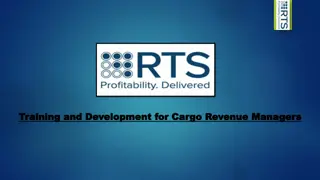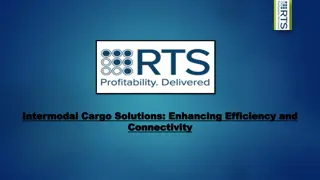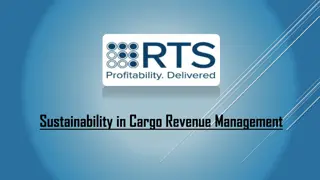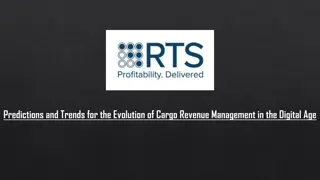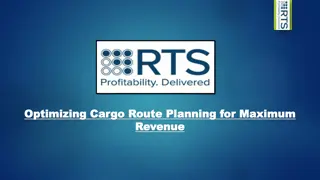Compliance and Regulatory Considerations in Cargo Revenue Management
Cargo revenue management is an intricate balancing act that involves maximizing revenue while managing the capacity and pricing of cargo space. For companies like Revenue Technology Service (RTS), the key to successful cargo revenue management lies not only in optimizing these factors but also in ensuring that all practices adhere to industry regulations. Compliance with regulatory standards is paramount in maintaining the integrity, efficiency, and profitability of cargo operations.n
Download Presentation

Please find below an Image/Link to download the presentation.
The content on the website is provided AS IS for your information and personal use only. It may not be sold, licensed, or shared on other websites without obtaining consent from the author.If you encounter any issues during the download, it is possible that the publisher has removed the file from their server.
You are allowed to download the files provided on this website for personal or commercial use, subject to the condition that they are used lawfully. All files are the property of their respective owners.
The content on the website is provided AS IS for your information and personal use only. It may not be sold, licensed, or shared on other websites without obtaining consent from the author.
E N D
Presentation Transcript
Compliance and Regulatory Considerations in Cargo Revenue Compliance and Regulatory Considerations in Cargo Revenue Management Management
Cargo revenue management is an intricate balancing act that involves maximizing revenue while managing the capacity and pricing of cargo space. For companies like Revenue Technology Service (RTS), the key to successful cargo revenue management lies not only in optimizing these factors but also in ensuring that all practices adhere to industry regulations. Compliance with regulatory standards is paramount in maintaining the integrity, efficiency, and profitability of cargo operations. Understanding Cargo Revenue Understanding Cargo Revenue Management Management Cargo revenue management involves forecasting demand, optimizing cargo space, and adjusting pricing strategies to maximize revenue. This process requires a detailed analysis of market trends, customer behavior, and operational capacities. Revenue Technology Service (RTS) leverages advanced algorithms and data analytics to provide insights that help cargo operators make informed decisions. However, these practices must be aligned with the various regulations governing the aviation and shipping industries to avoid legal complications and ensure smooth operations.
Regulatory Framework in Cargo Revenue Management Regulatory Framework in Cargo Revenue Management The regulatory landscape in the cargo industry is complex, involving multiple agencies and international bodies such as the International Air Transport Association (IATA), Federal Aviation Administration (FAA), and International Maritime Organization (IMO). These organizations set standards for safety, security, environmental impact, and fair trade practices. 1. 1.Safety Regulations Safety Regulations: Ensuring the safe transport of goods is a top priority. Compliance with safety standards involves adhering to guidelines on packaging, handling hazardous materials, and maintaining the structural integrity of cargo holds. RTS integrates safety compliance into its revenue management systems to prevent accidents and avoid hefty fines. 2. 2.Security Measures Security Measures: The transport of goods, especially across international borders, requires stringent security protocols. Regulatory bodies mandate measures to prevent smuggling, terrorism, and theft. Cargo revenue management systems must incorporate these security requirements to ensure cargo is transported securely and within legal frameworks. 3. 3.Environmental Regulations Environmental Regulations: With increasing global emphasis on sustainability, regulatory bodies have imposed strict environmental standards on the cargo industry. This includes limitations on emissions, noise pollution, and waste management. RTS helps cargo operators comply with these regulations by optimizing routes and improving fuel efficiency. 4. 4.Fair Trade Practices Fair Trade Practices: Anti-competitive practices and price fixing are strictly prohibited. Regulatory bodies enforce rules to maintain fair competition in the market. RTS ensures that its revenue management strategies are transparent and compliant with fair trade laws, promoting healthy competition and fair pricing.
Challenges in Challenges in Compliance penalties, legal actions, and reputational damage. Cargo operators must stay updated with regulatory changes and ensure that their revenue management practices evolve accordingly. RTS provides continuous updates and support to help clients remain compliant with the latest regulations. Compliance : Navigating the maze of regulations can be challenging. Non-compliance can result in severe Conclusion Conclusion: In the realm of cargo revenue management, compliance with regulatory standards is not just a legal obligation but a strategic necessity. Revenue Technology Service (RTS) plays a crucial role in helping cargo operators navigate the complex regulatory environment. By integrating compliance into its revenue management solutions, RTS ensures that cargo operators can maximize their revenue potential while adhering to industry regulations. This not only safeguards the company's operations but also contributes to the broader goals of safety, security, environmental sustainability, and fair trade in the cargo industry.
